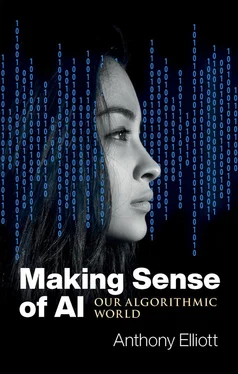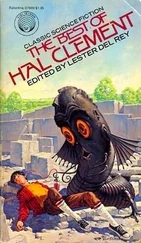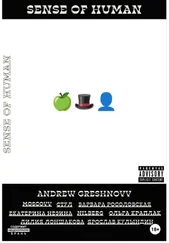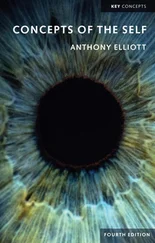The right of Anthony Elliott to be identified as Author of this Work has been asserted in accordance with the UK Copyright, Designs and Patents Act 1988.
First published in 2022 by Polity Press
Polity Press
65 Bridge Street
Cambridge CB2 1UR, UK
Polity Press
101 Station Landing
Suite 300
Medford, MA 02155, USA
All rights reserved. Except for the quotation of short passages for the purpose of criticism and review, no part of this publication may be reproduced, stored in a retrieval system or transmitted, in any form or by any means, electronic, mechanical, photocopying, recording or otherwise, without the prior permission of the publisher.
ISBN-13: 978-1-5095-4889-7
ISBN-13: 978-1-5095-4890-3 (pb)
A catalogue record for this book is available from the British Library.
Library of Congress Cataloging-in-Publication Data
Names: Elliott, Anthony, 1964- author.
Title: Making sense of AI : our algorithmic world / Anthony Elliott.
Description: Medford, MA : Polity Press, 2021. | Includes bibliographical references and index. | Summary: "An expert and essential introduction to AI in the modern world"-- Provided by publisher.
Identifiers: LCCN 2021014427 (print) | LCCN 2021014428 (ebook) | ISBN 9781509548897 (hardback) | ISBN 9781509548903 (paperback) | ISBN 9781509548910 (epub) | ISBN 9781509550845 (pdf)
Subjects: LCSH: Artificial intelligence--Social aspects. | Change. | Civilization, Modern--21st century.
Classification: LCC Q335 .E375 2021 (print) | LCC Q335 (ebook) | DDC 006.3--dc23
LC record available at https://lccn.loc.gov/2021014427
LC ebook record available at https://lccn.loc.gov/2021014428
by Fakenham Prepress Solutions, Fakenham, Norfolk NR21 8NL
The publisher has used its best endeavours to ensure that the URLs for external websites referred to in this book are correct and active at the time of going to press. However, the publisher has no responsibility for the websites and can make no guarantee that a site will remain live or that the content is or will remain appropriate.
Every effort has been made to trace all copyright holders, but if any have been overlooked the publisher will be pleased to include any necessary credits in any subsequent reprint or edition.
For further information on Polity, visit our website: politybooks.com
This book develops central debates and issues first set out in my previous work, The Culture of AI (2019). That book documented the spread of the AI revolution as consisting of massive changes in the here-and-now of everyday life. Building upon those ideas, I focus here on how this transformation also involves the systematic phenomenon of advanced automation across modern institutions, which is profoundly impacting contemporary societies in many significant ways. Drawing technology, economy and society together in a reflective configuration, I seek throughout this book to develop an analysis of the complex AI systems which ‘rewrite’ people’s lives. Both the complex systems associated with AI and the distinctive ‘human–machine interfaces’ it produces, I argue, bring into existence automated intelligent agents powerfully transforming both public and private life.
Some research reported in this book was supported by the Australian Research Council grants ‘Industry 4.0 Ecosystems: A Comparative Analysis of Work–Life Transformation’ (DP180101816) and ‘Enhanced Humans, Robotics and the Future of Work’ (DP160100979). Other research not explicitly detailed, but upon which I draw implicitly in the argumentation of the book, includes my recent European Commission Erasmus+ grants ‘Discourses on European Union 14.0 Innovation’ (611183-EPP-1-2019-1-AU-EPPJMO-PROJECT) and Jean Monnet Network ‘Cooperative, Connected and Automated Mobility’ (599662-EPP-1-2018-1-AU-EPPJMO-NETWORK). Many thanks to the funding agencies which have supported this research. Huge thanks to my wonderful colleagues at the Jean Monnet Centre of Excellence at the University of South Australia, especially Louis Everuss and Eric Hsu. Ross Boyd assisted with the preparation of the manuscript, and was marvellously helpful in making many suggestions that I was able to directly incorporate into the text. At Keio University in Japan, where I regularly visit as part of the Super-Global Program, my thanks as ever to Atsushi Sawai. At University College Dublin, where I also regularly visit, my thanks to Iarfhlaith Watson and Patricia Maguire.
I am very grateful for discussions on various themes with many colleagues who have helped me, directly or indirectly, in the development of my thinking on AI. These include Tony Giddens, Nigel Thrift, Helga Nowotny, Massimo Durante, Vincent Müller, Toby Walsh, Masataka Katagiri, Ralf Blomqvist, Rina Yamamoto, Takeshi Deguchi, Ingrid Biese, Bo-Magnus Salenius, Hideki Endo, Robert J. Holton, Thomas Birtchnell, Charles Lemert, Ingrid Biese, Peter Beilharz, Sven Kesselring, John Cash, Nick Stevenson, Anthony Moran, Caoimhe Elliott, Oscar Elliott, Mike Innes, Kriss McKie, Fiore Inglese, Niamh Elliott, Oliver Toth, Nigel Relph and Gerhard Boomgaarden. John Thompson, my editor at Polity, offered substantive comments that helped transform the book, and it is wonderful to be working with him again. Many thanks also to Julia Davies at Polity. I should like to thank Fiona Sewell for her careful copy-editing. Finally, Nicola Geraghty heard everything in this book first and half-raw, and her support as always made all the difference.
Anthony Elliott
Adelaide, 2021
1 The Origins of Artificial Intelligence
In this chapter, I shall not attempt to develop anything like a comprehensive account of the development or current state of artificial intelligence (AI). Since I want to situate my discussion in this chapter and the next in the context of changing relations between society and technology, I will concentrate mainly, although not wholly, on tracing AI through a range of common uses, divergent histories, economic interests and power structures. AI, at once a specialist field and global industry, is often presented as immutable or inevitable. But AI is plural and pluralizing, woven of a whole tissue of different cultural conversations, social practices and technological assemblages. To say this does not mean ignoring the technical knowledge which underpins AI, or placing the whole weight of emphasis upon the social, cultural and political dimensions of the digital revolution. But it is vital, I shall argue, to see that other forms of power, different stocks of knowledge and other ideologies lurk inside the discourse of AI – all of which have unintended consequences and impact upon social development in the current period. In the opening section of the chapter, I outline some general notions connected with the development of AI, which will help construct key underlying themes of this book as a whole. My focus is on unravelling the many different definitions of AI. In the second section, I situate AI in the broad context of both globalization and everyday life. Notwithstanding the dominance of technical thinking which privileges a ‘black box model’ of inputs and outputs, my argument is that the rise of automated intelligent machines should be studied as expressing or incorporating forms of sociality, stocks of cultural knowledge, and unequal power relations that provide a focal point for the investigation of AI.
What is Artificial Intelligence?
In the case of artificial intelligence, it is widely, though erroneously, assumed that its history can and ought to be mapped, measured and retold by recourse and recourse only to AI studies – and that if any of this history falls outside of the purview of the disciplines of engineering, computer science or mathematics, it might justifiably be ignored or assigned perhaps only a footnote within the canonical bent of AI studies. Such an approach, were it attempted here, would aim at reproducing the rather narrow range of interests of much in the AI field – for example, definitional problems or squabbles concerning the ‘facts of the technology’. 1What, precisely, is machine learning? How did machine learning arise? What are artificial neural networks? What are the key historical milestones in AI? What are the interconnections between AI, robotics, computer vision and speech recognition? What is natural language processing? Such definitional matters and historical facts about artificial intelligence have been admirably well rehearsed by properly schooled computer scientists and experienced engineers the world over, and detailed discussions are available to the reader elsewhere. 2
Читать дальше

![Джейн Остин - Sense and Sensibility [С англо-русским словарем]](/books/26612/dzhejn-ostin-sense-and-sensibility-s-anglo-thumb.webp)










